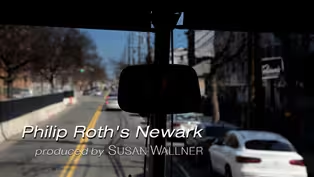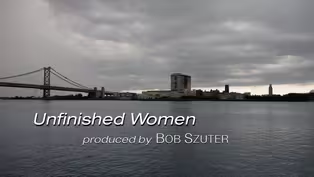State of the Arts
Farah: Music by Daniel Bernard Roumain
Clip: Season 42 Episode 1 | 8m 59sVideo has Closed Captions
Haitian-American composer, violinist and activist Daniel Bernard Roumain's "Farah (Joy)."
The New Jersey Symphony debuts Haitian-American composer, violinist and activist Daniel Bernard Roumain’s ""Farah (Joy),"" featuring the singer Becky Bass. Roumain, also known as DBR, collaborated with spoken-word poet, dancer and actor Marc Bamuthi Joseph. According to DBR, the work ruminates on the black experience in America, community, things worth protesting, love and joy.
Problems playing video? | Closed Captioning Feedback
Problems playing video? | Closed Captioning Feedback
State of the Arts is a local public television program presented by NJ PBS
State of the Arts
Farah: Music by Daniel Bernard Roumain
Clip: Season 42 Episode 1 | 8m 59sVideo has Closed Captions
The New Jersey Symphony debuts Haitian-American composer, violinist and activist Daniel Bernard Roumain’s ""Farah (Joy),"" featuring the singer Becky Bass. Roumain, also known as DBR, collaborated with spoken-word poet, dancer and actor Marc Bamuthi Joseph. According to DBR, the work ruminates on the black experience in America, community, things worth protesting, love and joy.
Problems playing video? | Closed Captioning Feedback
How to Watch State of the Arts
State of the Arts is available to stream on pbs.org and the free PBS App, available on iPhone, Apple TV, Android TV, Android smartphones, Amazon Fire TV, Amazon Fire Tablet, Roku, Samsung Smart TV, and Vizio.
Providing Support for PBS.org
Learn Moreabout PBS online sponsorship[ Music plays ] Narrator: The New Jersey Symphony Orchestra held their final concert of the season in June 2023.
It began with a new work by Daniel Bernard Roumain called "Farah".
"Farah" is the Arabic word for joy.
Bass: [ Singing ] Remember me, a black girl named for joy.
Roumain: This piece is the beginning of my open hand, proclaiming my love for the people that lift me up, and "Farah" is the first piece that is centering forgiveness.
Bass: [ Singing ] Farah, Farah.
Farah, Farah.
Narrator: Singer Becky Bass was the featured soloist.
Bass: I see Daniel as a revolutionary.
I mean, I think that what he is doing is so crucial to music today, especially in the classical world, because you don't see many composers that look like him that are talking about real life things that happen to people of color, and he's really bringing these to light through classical music.
Roumain: What I wanted to do is write a piece that could begin a program that is a celebration.
Narrator: Daniel, known by his initials, "DBR", is the New Jersey Symphony Orchestra's first resident artistic catalyst.
Roumain: It's a curious title that speaks to my role in helping the orchestra adapt to an ever-changing community.
We are looking at equity.
We are looking at diversity.
We are looking at what is the role that orchestral musicians can play in the healing of a community.
Zhang: We commission him to write works for us and he also performs with us.
He's a great violinist.
He sometimes would curate some series to do in Museum of Art in Newark, and also with students.
He's a great advocate, you know, to engage younger people as well.
Roumain: Any note.
Any sound.
I trust her.
[ Violin music plays ] Roumain: Well, I started playing the violin when I was five years old.
It was a small town called Margate, Florida, and I would say each year, I started picking up other instruments, and I kind of had two lives.
I was jamming with my friends on the weekends in, you know, these rock bands, and then during the week, I was playing in all different types of orchestras.
Narrator: After college at Vanderbilt University and grad school at the University of Michigan, Daniel moved to New York City in 1998 to launch his career.
Roumain: My first job was playing for dancers.
I played from 9:00 AM until midnight.
I played for the Martha Graham Dance Company, Jose Limon Dance Company, the Paul Taylor Dance Company.
Oh, Alvin Ailey, of course.
Narrator: Soon, the great dancer-choreographer Bill T. Jones took notice.
Roumain: And I immediately became his music director, principal composer.
I performed with him on stage.
He took me around the world with the company, and that changed my life.
Just a genius.
Zhang: He's a great, fun, collaborative, intelligent person, but he has strong beliefs -- quality, diversity, you know, inclusion.
He has very strong beliefs, and he's not shy of speaking that, which is great.
[ Piano music plays ] Roumain: The wonderful Korean pianist Min Kwon asked me to write variations on "America the Beautiful", and the title of of that work, my variations, is "America" -- capital letters -- "NEVER Beautiful".
[ Piano music plays ] Now, what you have to understand is the piece was written at the height of the pandemic, at a time of worldwide protest.
I never thought I would live long enough to see a worldwide event in which people of all different races and ages and sexual orientations were rallying around the murder of one black man in Minneapolis, in George Floyd.
That was a seismic shift for me, and at the time, I was feeling rage, when I was feeling that "I want my country to be better."
Narrator: In his first composition for the New Jersey Symphony, Daniel dealt head-on with the issue of race again.
Roumain: I work with the title first oftentimes, then the piece comes.
So I thought of, "Well, what's a title that speaks to the now?
What am I feeling right now?"
And it came to me kind of in a text message to a friend.
I said, "I think I know the title of this piece.
It's going to be 'I am a white person who blank Black people' and I'm going to leave it blank."
Classical music still is kind of almost monolithically white in many ways, although that is changing, but the title was a way of centering this idea of how does a largely white institution feel about Black people?
[ Music plays ] Narrator: Daniel's new composition, "Farah", focuses on a very different message and speaks to very different emotions.
Roumain: I spent the last two years, like everyone else, in a kind of cultural hibernation.
I had a lot of time to think.
I was protesting with my fists closed and up in the air.
Rage is exhausting for me, and this piece is the beginning of my open hand.
and 'Farah" is the first piece that is centering forgiveness, Bass: [ Speaking ] "Remember me, a black girl named for joy."
That is how we start this piece.
[ Singing ] Remember me, a black girl named for joy.
Roumain: And the words are by Marc Bamuthi Joseph.
I'm a Haitian-American composer.
Marc is a Haitian-American writer.
He's a wonderful spoken word artist and librettist.
He wrote the libretto for my opera, "We Shall Not be Moved".
Man: [ Singing ] Love is the only word sweeter than black.
Love is the only word sweeter than black.
Love is the only word sweeter than black.
Roumain: Marc and I have been performing with one another for probably about 10 years now.
Joseph: [ Singing ] ...of the wrong class, of the wrong cast.
Placed on the lower track at six years young.
Bass: [ Speaking ] And then with "Farah", with joy, it's this journey of, you know, going through the anger, then coming to a place of forgiveness.
[ Singing ] Look for me at the coast.
When the sun crests, remember how my hips rose.
When the day breaks.
Think of a woman.
Without the luxury to pause.
[ Speaking ] One of my favorite parts is toward the end of the piece, and it goes like, "Could you remember a woman like me and love her presently?
Could you love her before she was a memory?
[ Singing ] ...presently.
Presently.
Presently.
Presently.
Roumain: The question Marc and I have been asking ourselves -- as black men in America, what is our role and responsibility towards forgiveness?
Bass: [ Singing ] Presently.
Presently.
Presently.
Presently.
[ Music plays ] [ Applause ]
Video has Closed Captions
Clip: S42 Ep1 | 9m | The celebrated novelist Philip Roth set most of his work in his hometown of Newark, NJ. (9m)
Video has Closed Captions
Clip: S42 Ep1 | 6m 31s | Aishah Rahman's underground classic "Unfinished Women," as staged by Camden Rep. (6m 31s)
Providing Support for PBS.org
Learn Moreabout PBS online sponsorship
- Arts and Music
The Best of the Joy of Painting with Bob Ross
A pop icon, Bob Ross offers soothing words of wisdom as he paints captivating landscapes.













Support for PBS provided by:
State of the Arts is a local public television program presented by NJ PBS


